What Does Duck Taste Like? A Flavorful Journey Beyond Chicken
Duck, a culinary delicacy enjoyed by food enthusiasts worldwide, often sparks curiosity among those unfamiliar with its unique characteristics.
Many people wonder about the flavor profile of this distinctive poultry option.
Unlike chicken or turkey, duck offers a more complex and intriguing taste experience that can surprise even seasoned meat lovers.
The richness and depth of duck meat set it apart from other poultry choices, making it a favorite among gourmet chefs and home cooks alike.
Its reputation for being a luxurious and flavorful protein has piqued the interest of countless food adventurers seeking something beyond ordinary meal options.
Cultural cuisines around the globe have embraced duck in various preparations, each highlighting its remarkable qualities.
Your culinary journey into understanding this remarkable meat is about to uncover some mouth-watering insights that will transform how you think about poultry.
Duck Explained
Duck meat offers a delightful alternative for chicken lovers, with a slightly richer taste that sets it apart from standard poultry.
Duck carries a strong flavor that many food enthusiasts consider more complex than chicken.
Different duck sources can impact the overall taste profile.
British ducks, for instance, showcase a gentle and mouth-watering quality with a subtle richness that spreads across your palate.
Describing duck's unique flavor characteristics remains challenging, as does explaining how it pairs with complementary dishes.
Duck meat typically has a substantial, juicy texture with an ideal amount of fat.
Most diners appreciate its tender composition.
Many expect duck to resemble chicken or turkey, but the experience proves quite different.
Duck meat's rich quality works wonderfully as an appetite enhancer.
Skin adds another distinctive element to the meat.
Despite its higher fat content, duck remains popular among various diners, including health-aware individuals.
Flavor of Duck Meat
Duck meat is tender and juicy, with a flavor that reminds some people of steak but still feels lighter than beef.
It has a strong, hearty taste that stands out more than chicken, yet it isn’t heavy, so families can enjoy it without feeling stuffed.
The skin is rich in fat, so getting it crispy takes a bit of care when cooking; otherwise, it might turn out rubbery.
The texture of duck meat depends on the breed, some ducks have meat that’s soft like chicken, while others are chewier and richer.
People often notice duck is a bit oilier and more complex in taste than chicken, but many first-timers find it both familiar and unique.
Trying duck is the best way to find out if you like it, and learning to cook it at home can help you discover what makes its flavor special.
Duck usually costs more than chicken, but roasting it for a special meal can make the experience feel worth it.
Duck Breast vs. Duck Leg: Flavor Differences
Duck breast and duck leg taste different because of their fat and texture.
Duck breast is leaner and has a mild, almost steak-like flavor that is soft and juicy when cooked just right.
Duck leg is richer, more flavorful, and tastes a little stronger because it has more fat and is often cooked longer, which makes it tender and full of deep, savory taste.
If you want something lighter and more delicate, go for duck breast, but if you love bold, comforting flavors, duck leg is a great choice.
Does Duck Taste Like Fish?
Duck meat cooked correctly should not taste like fish.
Duck meat should instead offer a sweet and savory profile with buttery hints inside and a juicy, tender feel.
Meat that smells or tastes like fish likely means the duck has spoiled and needs throwing away.
Some duck meat can carry a strong fishy taste and smell.
Wild ducks might have unusual flavors based on their diet.
Wild ducks often eat small creatures like frogs, tiny fish, mollusks, worms, algae, and small water creatures.
Farmed ducks cost less and typically eat grains, grass, and seeds.
Duck diet directly impacts meat flavor, so choosing domesticated ducks works best.
Domesticated ducks usually have more meat, a richer fat content, and a sweeter taste compared to wild varieties.
Is Duck a Good Chicken Swap?
Duck offers a stronger flavor compared to chicken, which many meat eaters are more familiar with. Chicken remains one of world's most popular meat choices, but that doesn't mean it surpasses duck in quality.
Duck meat contains rich amounts of vitamins, minerals, and healthy unsaturated fats with a delightful taste. Its nutritional profile stands out more impressively than chicken's standard offerings.
Mineral content in duck significantly outperforms chicken in several key areas:
Chicken does excel in some mineral categories:
Duck meat brings several advantages over chicken:
Careful cooking makes duck truly special. Properly prepared duck develops a crispy skin with a soft, rich, and succulent inner texture.
Bonus tip: leftover duck fat works wonderfully for adding unique flavor to other dishes.
Does Duck Remind You of Steak?
Duck carries a rich, meaty taste more similar to beef than chicken, with a texture matching steak.
Careful cooking results in a succulent piece of meat with crispy outer skin.
Duck's deep color comes from high levels of myoglobin, a protein that gives meat its red tone.
Muscles used for flying and swimming make breast and leg cuts particularly flavorful.
Cooking duck works best when following steak preparation methods.
Slow cooking helps create perfectly prepared meat with ideal fat levels.
Nutrition in Duck Meat
Duck meat can offer amazing health benefits when prepared correctly.
Health experts confirm ducks provide key nutrients that support overall wellness.
Packed with essential proteins and minerals, duck serves as a delicious meal choice for those seeking balanced nutrition:
Great Source Of Protein
Protein-packed meals support health goals for those watching their weight.
Meals high in protein can help control hunger and keep you feeling full throughout the day.
These foods support weight loss efforts by boosting metabolism and encouraging fat burning.
Duck meat stands out as a smart choice for health-conscious individuals.
Consuming this protein source may strengthen your immune system and help maintain muscle mass.
Protein works hard to keep your body strong and supports ongoing fitness progress.
Muscle growth becomes easier when you include enough protein in your diet.
Body systems function better with balanced protein intake, making each meal a chance to support your overall wellness.
This Product Has A Lot Of Selenium
Duck meat contains high levels of selenium that helps the body take in strong antioxidants.
Scientists suggest this meat might lower cancer risks in certain cases.
Consuming duck could support brain wellness and strengthen immune defenses.
Medical research indicates duck could provide significant relief for individuals managing asthma symptoms.
Health experts also believe duck consumption might support thyroid function and protect heart health.
Plenty Of Vitamins Included
Duck meat serves as a nutritious protein source packed with helpful health advantages.
This tasty meat contains multiple essential vitamins that support your body's wellness.
Vitamin intake from duck helps strengthen immune system responses and supports critical healing processes.
Specific nutrients in duck meat assist with repairing bone structures, teeth, and cartilage connections.
Cell protection becomes more effective through regular consumption of these protein-rich meat selections.
Duck provides important resources that help your body maintain strong internal systems and combat potential health challenges.
Consuming duck meat offers multiple wellness benefits that contribute to overall physical strength and durability.
Wild vs. Farmed Duck: Which Is Better?
Wild duck brings an incredible flavor profile that stands out from other meat options.
Ducks roaming free in nature enjoy unrestricted movement and consume diverse food sources.
Their ability to fly long distances and navigate challenging environments contributes to muscle development.
These natural conditions create meat with robust characteristics.
Domesticated ducks experience different living conditions compared to their wild counterparts.
Farm-raised environments limit their movement and dietary options.
Such controlled settings impact meat composition and overall taste experience.
Wild duck meat carries more intense flavors and complex notes.
Farm-raised ducks provide an excellent alternative when hunters cannot source wild game.
While slightly different in taste, domesticated duck still offers a delicious protein option for meal preparation.
Wild duck remains superior for those seeking rich, deep flavor profiles that reflect natural living conditions.
What Does Gamey Duck Mean?
When people say duck tastes “gamey,” they mean it has a stronger, earthier flavor than regular chicken or turkey.
Gamey duck meat can taste a little wild, with a richer, deeper taste that’s sometimes described as bold or slightly musky.
This flavor is more common in wild ducks because of what they eat in nature, like small fish or plants.
Farm-raised ducks usually taste milder and less gamey, so the strong flavor is not as noticeable.
If you enjoy meats with more character and depth, you might like the unique, gamey flavor of duck.
Flavors Found in Duck Eggs
Duck eggs taste like chicken eggs, but with a more intense flavor.
Ducks eat a wide range of foods, which gives their eggs a stronger taste.
Their diet as omnivores creates rich and deep flavors.
Ducks enjoy eating small creatures like snails, insects, and slugs.
What these birds munch on directly impacts how their eggs taste and smell.
Compared to chicken eggs, duck eggs have larger yolks with more cholesterol and fat.
They also pack extra protein and higher amounts of omega-3 fatty acids.
Paleo diet followers often choose duck eggs because they like high-fat foods.
Duck eggs share many nutritional qualities with standard chicken eggs.
Buying and Cooking Duck Meat
When shopping for duck meat, freshness matters a lot.
Shoppers can buy any duck part for roasting, but selecting the whole duck works best.
Dark-colored meat signals good quality.
Meat that looks yellow or gray means it's not fresh.
Color tells you everything about the meat's condition.
Whole ducks offer the most reliable choice for cooking.
Duck meat has a unique cooking profile.
Its flavor stands out as much stronger than chicken, with a rich and juicy taste.
Duck meat feels similar to chicken but carries more oil in its texture.
Roasting works wonderfully for this meat.
Baking offers another great option that highlights duck's delicious qualities.
Cooks find duck surprisingly simple to prepare and incredibly satisfying to serve.
Best Vegetables With Duck
Brussels sprouts, creamed spinach, mashed potatoes, fried mushrooms, arugula, tomatoes, cabbage, broccoli, bell pepper, grilled asparagus, green peas, carrot, roasted beets, celery, and courgette work well with duck.
Sprinkle your favorite spices to make the duck and vegetables more flavorful and moist.
Duck matches wonderfully with almost everything, from fruits and vegetables to different meats and seafood.
Duck meat brings a smooth, succulent texture that feels crispy on the outside and tender inside.
You can add duck to whatever dish catches your eye!

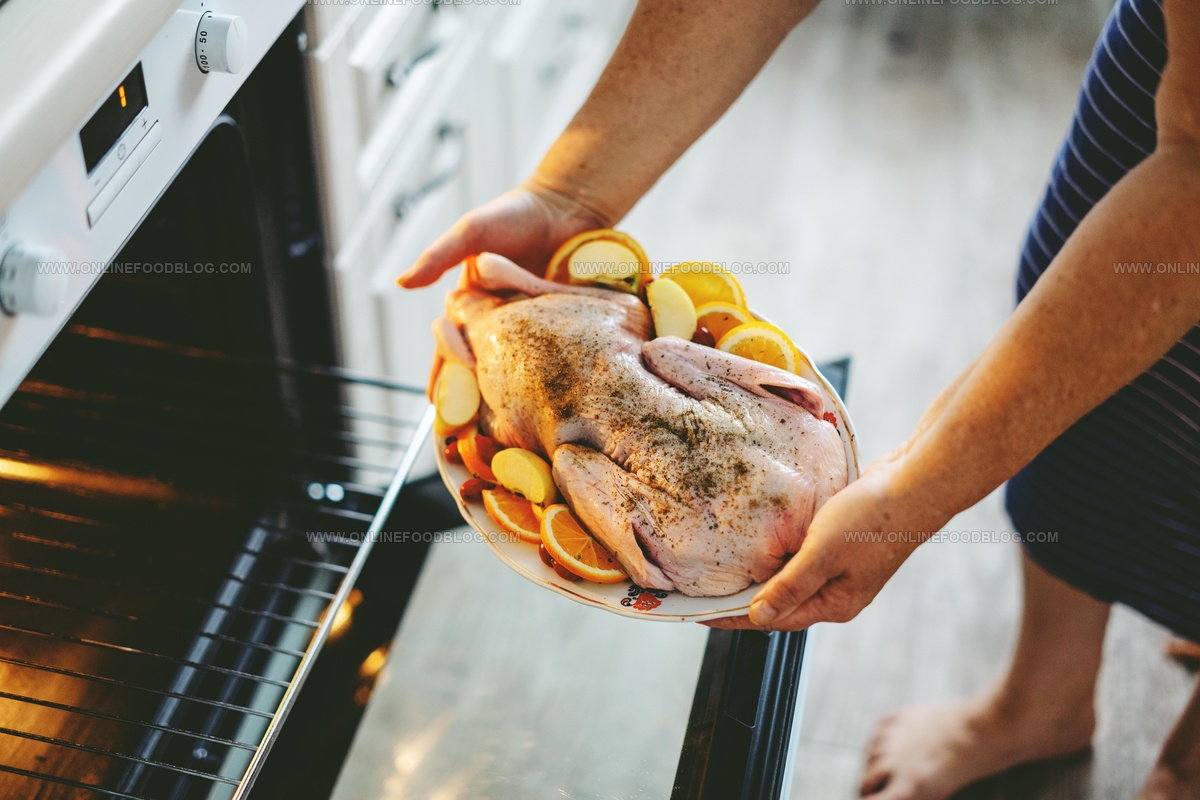
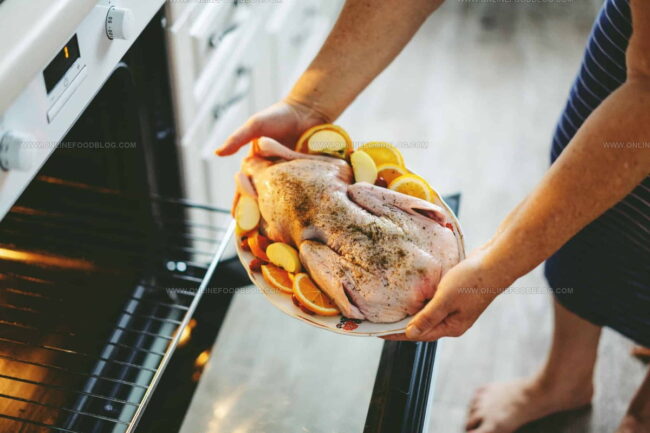
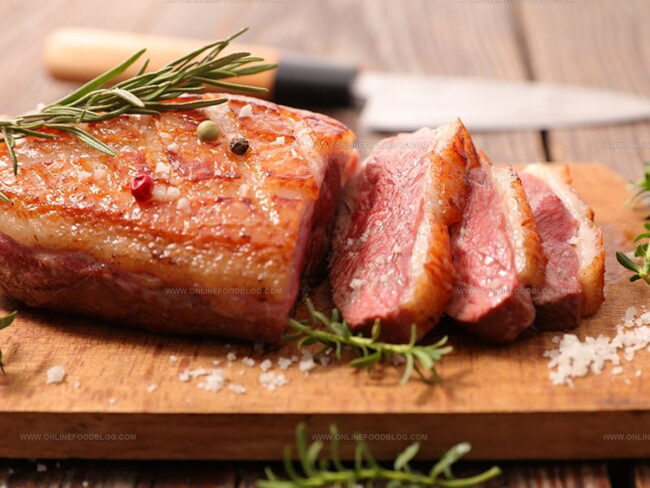
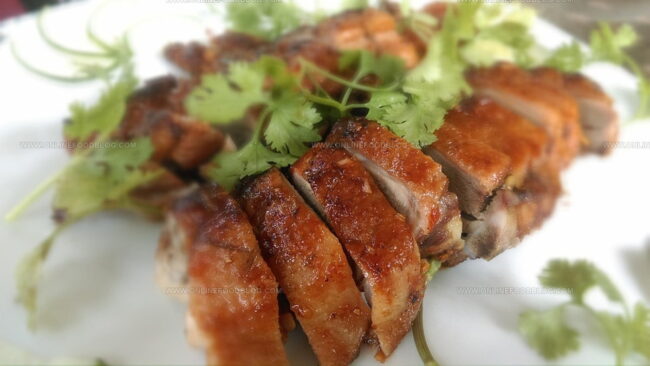
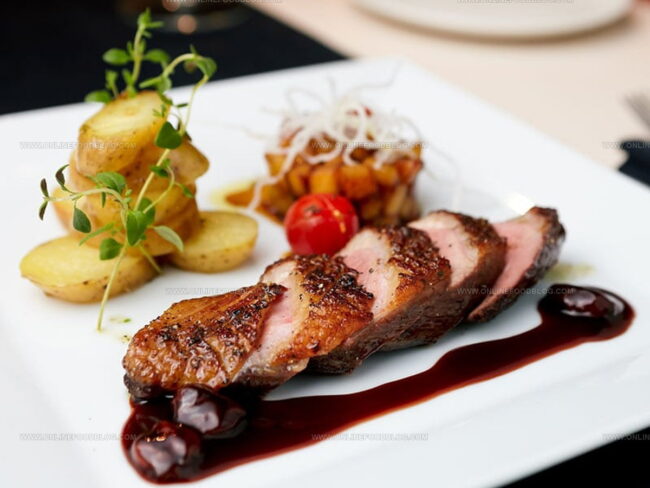
Mia Reynolds
Food Writer & Home Cooking Specialist
Expertise
Easy Home Baking, Recipe Writing and Storytelling, Local and Seasonal Ingredients, Baking for Beginners
Education
New England Culinary Institute (NECI), Montpelier, Vermont
Community College of Vermont, Winooski, Vermont
Mia Reynolds fell in love with baking as a teenager experimenting in her family kitchen. Her passion took her to New England Culinary Institute, where she learned practical pastry techniques, and later to Community College of Vermont to deepen her understanding of food management.
Mia combines clear, simple baking instructions with heartwarming stories, making home baking approachable for everyone.